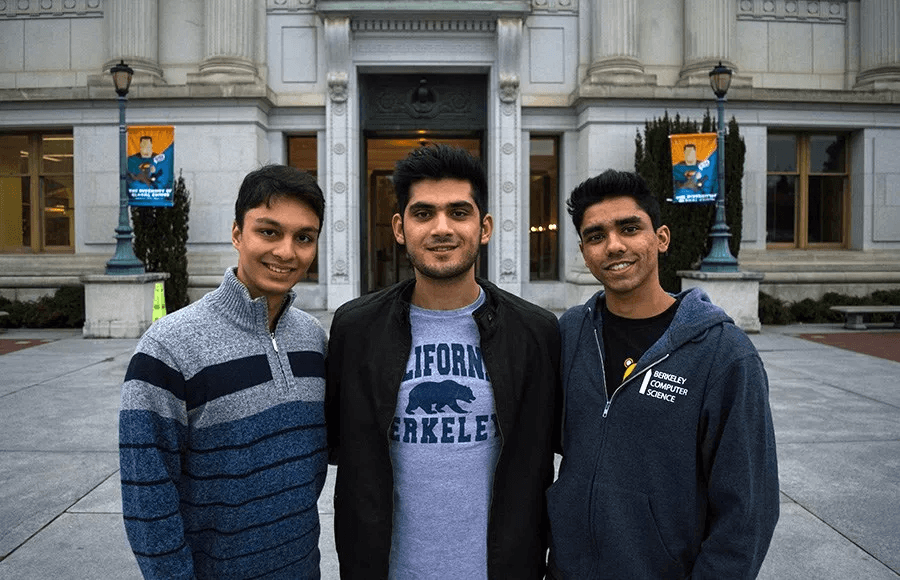
Photo credit: Quartz.
With 4,200 tech startups and a 40 percent annual startup growth rate, India is exploding as the third-largest tech startup hub in the world.
The startup culture of Silicon Valley has inspired young Indians to build similar successes at home. As a result, students are making a significant impact in the local startup scene. A young country with almost 65 percent of the population between 25 to 35 years old, India saw 350 student-run startups in 2016. That’s a 25 percent rise from the previous year.
Today, the student entrepreneurship scene in India shows “signs of maturing, though a lot of work still needs to be done,” remarks Ganesh Vancheeswaran, author of BHAAG!.
Here are five student-run Indian startups that we think deserve your attention.
1. LAWIN1 – Manik Gupta and Pradeep Kumar, Army Institute of Law, Mohali
Manik Gupta and Pradeep Kumar started Lawin1 in their third year of law school to learn some basic legal drafting by doing real-life projects for clients.
“We were bored of college life and wanted to learn something beyond just theory,” says Manik.
Lawin1 was launched in September 2014 as an online platform delivering legal services. By the end of 2016, they had more than 600 clients, ranging from traditional manufacturing houses to well-funded ventures. The company registered 20 percent annual growth.
2. CampusKnot – Rahul Gopal, Hiten Patel and Perceus Mody, and German student Katja Walter, Mississippi State University
The four young founders debuted CampusKnot in 2013, and spent two years refining their project. The site is a free online educational hub for managing classes and student organizations, tracking attendance and assignments, and hosting academic events. It also offers a marketplace for textbooks.
In 2015, CampusKnot received US$100,000 from a private investor.
3. Vegley – Shivank Garg, IIT Kanpur, and Shivam S. Garg, MAIT, Delhi

A picture of Shivank Garg and Shivam Garg. Photo Credit: YourStory.
The Garg brothers are not your usual tech entrepreneurs. In 2016, they made their first Rs INR 1 crore (about US$150,000) selling naturally ripened mangoes – a rare occurrence in the market.
98 percent of the market’s mangoes are ripened through adulterated methods with carcinogenic chemicals. Alarmed by this information, the brothers have now turned their focus to social entrepreneurship and advocacy, educating the government and raising awareness among the public.
4. Moonshot Accelerator – Abhinav Kukreja, Anish Prabhu and Aryaman Dalmia, UC Berkeley, USA

The three young student founders of Moonshot. Photo Credit: Aryaman Dalmia.
Inspired by Israel’s international successes in entrepreneurship, the young trio wanted to help India’s startups do the same.
In May 2016, they launched Moonshot, a company dedicated to connecting startups in India with resources from Silicon Valley, providing mentorship and funding for these new organizations. Understanding the potential India’s market has to go global, their aim is to connect startups in India with interns, mentors, and investors.
In fall 2016, Moonshot selected six startups to work with and is working with four to five startups for their Spring 2017 intake.
5. Braigo Labs – Shubham Banerjee, Champion School, USA
At 12 years old, Shubham Banerjee became the world’s youngest entrepreneur to receive venture capital funding for his life-changing invention.
Braigo, a combination of the words “LEGO” and “Braille”, is a low-cost printer for the visually impaired. A typical Braille printer can cost more than US$2000. Shubham’s printer, created from a Lego kit with basic hardware and software upgrades to print braille, costs just over US$350.
By the time Shubham was 13, he had secured hundreds of thousands of dollars of funding from Intel at the Intel Global Capital Summit to mass-produce the Braigo.
Growing as a country
Students are a significant demographic in India’s startup scene — and the government wants to help encourage them.
As part of Startup India, Invest India and UpGrad collaborated to launch the Startup India Learning Program, a free six-week online immersive program available in both Hindi and English. The program aims to help entrepreneurs get their ventures to the next level. Besides structured learning, participants can also learn from India’s best mentors and network with other entrepreneurs.

The interface of the Startup India Learning Program website. Photo Credit: Startup India.
The platform is expected to benefit more than 1 million new entrepreneurs in the next two years.
Banerjee sums it up nicely for every young Indian, remarking that it is “not that surprising for someone, even as young as me, to be able to do big things in Silicon Valley.”
This post 5 Indian student-led startups to watch in 2017 appeared first on Tech in Asia.